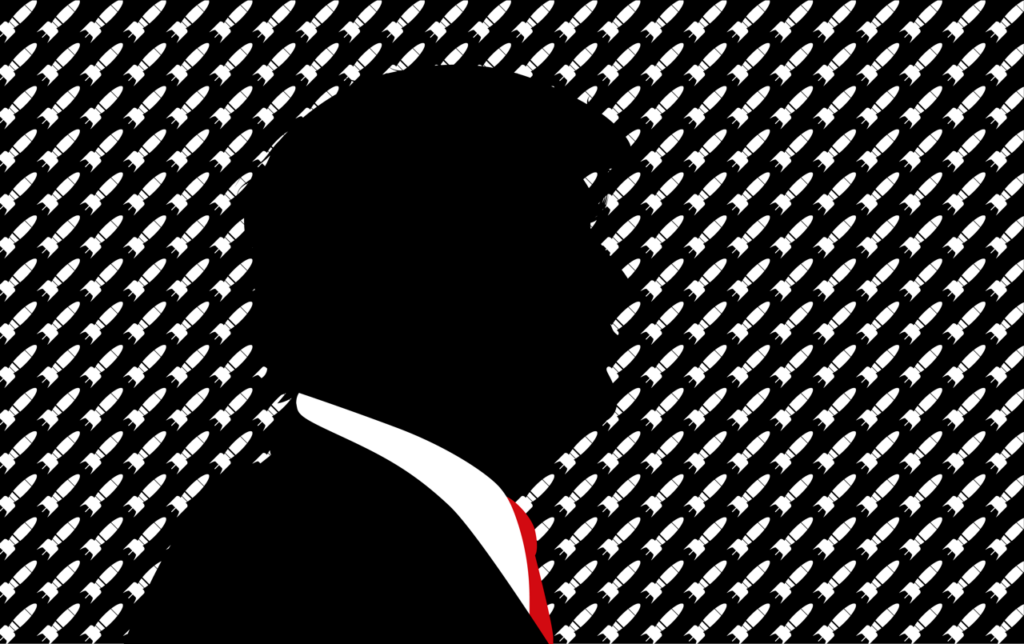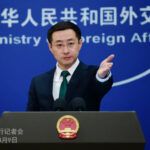What to expect from Trump’s second term: more erratic, darker, and more dangerous
By François Diaz-Maurin | November 7, 2024
 Illustration by Thomas Gaulkin / klyona / valeo6 / depositphotos.com
Illustration by Thomas Gaulkin / klyona / valeo6 / depositphotos.com
Those who managed to see Trump’s strategic plan for the country through the smoke screen of his brash and boisterous campaign should feel privileged. But most of us—including myself—are still trying to figure out what to make of Trump’s nationalist and isolationist grumbling in his off-script rallies, and whether he’ll stick to a Project 2025 template that the candidate distanced himself from during the campaign, but now his supporters say is the agenda.
The uncertainty does not exist only in the United States. Officials and analysts the world over wonder what Trump’s “peace through strength” approach means, and what they should expect from an erratic and unpredictable president-elect who may not have a concrete plan—or even “the concept of a plan”—for dealing with allies and adversaries.
Will Israel feel emboldened to extend its war to the Middle East? Should Europe worry about the United States reducing, or even ending, military aid to Ukraine? Should China prepare for a new confrontation with Washington? These are only a few of the many questions that have emerged from this year’s US presidential election outcome.
To help understand what the next four years may bring, I invited nuclear policy and security experts to share their views on what a Trump second term could look like—to the extent it is even possible to make any prediction. What they share paints a bleak picture of the US nuclear and foreign policy landscape—possibly with some bright spots and opportunities for increased stability.
Their responses have been lightly edited for length and clarity.
–François Diaz-Maurin
A dire global fallout
The global implications of the US election result cannot be overestimated. Choosing a leader to navigate the United States and the world through this time of global turmoil was critically important. As a friend recently put it to me, it’s as though the entire world has been waiting on the results of a biopsy. With the results in, the prognosis is dire. The United States, once a beacon of democratic values and practices, withers further into political chaos, and its influence in much of the world wanes at the same time that the nuclear threat increases. If left unchecked, a Trump administration’s policies will only increase this threat.
For the first time since the Cold War, the United States is poised to increase the number of its nuclear weapons. A Trump administration is likely to spend up to $2 trillion on the US nuclear arsenal in the coming decades. There is also a good chance that a shifting US policy toward Ukraine will allow Russian President Vladimir Putin to get away with nuclear blackmail, that Iran will become the world’s 10th nuclear-armed state, and that we’ll experience increased confrontation with China. A Trump administration will also almost certainly push for the resumption of nuclear weapons testing, normalizing what was unthinkable for decades and catalyzing the new nuclear arms race.
The next four years will be one of defending progress previously made, preventing bad trends from becoming worse, and laying the groundwork for when the moment is right to make transformational change.
–Emma Belcher, Ploughshares
A darker, more dangerous future
Americans have elected the first openly fascist president in US history. He will use his unchecked power to accumulate great wealth; policy will be a secondary consideration. Trump’s presidency will set back global responses to the climate crisis (a crisis he denies); weaken and perhaps collapse the US alliance system as allies find themselves standing alone against a rising authoritarian tide; fatally wound Ukraine’s defense against Russian imperialism; and give Israel’s government a blank check to pursue its wars. Social programs will be slashed while military budgets could soar. Defenses against pandemics will weaken.
The most serious—though not the most immediate—consequence of giving unchecked power to an unstable, unhinged man is that Trump will have the unfettered ability to launch nuclear weapons whenever he wants, for whatever reason. Americans may forever regret their failure to reform this outdated system of nuclear command and control when there was still a chance.
–Joseph Cirincione, nuclear policy analyst and author
Erosion of international norms
In terms of strategic consequences, the biggest immediate impact of Trump’s election will be on Ukraine and NATO, where Trump will likely seek to reduce or even end military support to Ukraine while putting pressure on Ukraine and Russia to negotiate a ceasefire. In such a deal, Russia would likely retain control over the roughly 20 percent of Ukrainian territory that it seized through force, and Ukraine would likely have to commit to not joining NATO. This would be an unpalatable outcome for many in the West, although, at this point, Ukraine has little prospect of winning back its eastern territory in what has become a costly and damaging war. Trump’s decision to wield his significant leverage by cutting support to Ukraine will force European NATO allies to foot more of the bill for Ukraine’s defense—as well as their own—to deter future Russian predations. Whether the other 31 NATO countries can step up to the plate with increased defense spending and whether they will remain unified in the face of Trump’s more transactional approach to alliances remains to be seen. Despite some pragmatic reasons for ending the war in Ukraine, a downside is that a negotiated ceasefire would erode the important international norm that territory cannot be acquired through the use of force.
Israeli Prime Minister Benyamin Netanyahu and his right-wing governing coalition will also benefit from Trump’s election, at great cost to a democratic Israel in the long run. While Trump has said that he wants Netanyahu to “wrap up” the Gaza war by the time Trump takes office in January, his election will also greenlight Israel’s ethnic cleansing of Palestinians and resettlement of northern Gaza, as well as possible Israeli annexation of the West Bank. This will cement Israel’s trajectory as an ethnonationalist apartheid state. Both the Palestinians and Israeli democracy will be among the big losers of Trump’s election.
–Nina Tannenwald, senior lecturer in political science at Brown University
A cloud with some silver lining
There were not many reasons to be optimistic about world affairs before the US elections. Now, after Trump’s victory, there are even fewer. It is very easy to come up with a list of issues that could go wrong—from the war in Ukraine to nuclear proliferation and arms control. Finding something positive is much more difficult, but one can think of a silver lining to this cloud. No one should seriously expect the Trump administration to stop the war in Ukraine in 24 hours. But if it tones down the “strategic defeat” rhetoric in its relationship with Russia, it could be a step in the right direction. This could also help salvage what is left of the nuclear arms control process or at least reach an understanding, maybe informal, on some restraints.
But it could easily go the other way.
There has been talk in the United States about resuming nuclear tests or getting into an arms race with China. Some countries are openly discussing the idea of getting nuclear weapons if they lose US protection. The United States is a key player in the existing nuclear order and its actions—or inactions—can do a lot of damage. But other countries have agency too, and they should not give up on that order easily. Institutions must be protected, laws and norms universally applied, and commitments honored. Resigning themselves to US disengagement and unpredictability should not be an option.
–Pavel Podvig, physicist and independent analyst with the Russian Nuclear Forces Project
Unfinished business
Nuclear arms control and nonproliferation are in for a rough ride over the next four years. Neither will likely be a priority for a second Trump administration but instead could be bargaining chips for other things Trump may want, such as in his relationships with Russia or China. US pressure to end Israel’s assault on Gaza and Russia’s invasion of Ukraine will have long-lasting impacts on the risks that nuclear weapons pose.
Trump is unlikely to reprise his nuclear diplomacy with North Korea, perhaps writing this off as a waste of time. Hopefully, he will avoid the nuclear tit-for-tat threat escalation of 2017. If, however, Trump sees North Korea as unfinished business, he may seek Vladimir Putin’s—not Xi Jinping’s—help this time in persuading Kim Jong-un to come to the table. Leverage on North Korea as a collateral benefit to a resolution on Ukraine is one potential outcome.
Having torpedoed the Iran nuclear deal in his first term, Trump will likely avoid negotiations with Iran in his second. Responding to Iranian provocations, however, will be unavoidable and carry nuclear risks. The fallout from other foreign policy thrusts—support for Israel and pressure on Ukraine—may increase proliferation pressures on Europe, where they have long lain dormant, and in the Middle East, where they are close to the surface. Trump 2.0 will likely pursue a nuclear relationship with Saudi Arabia.
Because of China’s nuclear buildup, Trump is unlikely to seek a follow-on agreement to New START, which expires in 2026. He may balk at the costs of building more US nuclear weapons, however. For better or worse, Putin could see both tactical and strategic advantages in promoting a New START-“lite” to rekindle his manipulative relationship with Trump.
–Sharon Squassoni, research professor of international affairs at George Washington University
Increased nuclear dangers
With the re-election of Donald Trump, nuclear dangers just became more dangerous. A bombastic, unpredictable, authoritarian Trump will again have sole authority to order the use of US nuclear weapons and control over the direction of nuclear weapons policy. The second Trump administration will likely bring in a group of opportunistic, loyalist appointees who have promoted foreign policies and nuclear weapons policies that would—if enacted—put the indispensable norms against nuclear proliferation, nuclear weapons use, threats of use, nuclear testing, and nuclear arms racing under stress like never before.
With the last remaining agreement limiting the massive US and Russian nuclear arsenals, New START, due to expire in February 2026, a dangerous three-way nuclear arms race that no one can win and no one can afford may follow. Previously, Trump and his advisors showed little capacity or interest in engaging in a new bilateral arms control framework. Nevertheless, maintaining caps on strategic nuclear arsenals, even by way of an informal agreement between Trump and Russian President Vladimir Putin, would serve US and global interests.
In the months ahead, responsible members of Congress, Western and non-nuclear weapon states, and civil society campaigners must find effective ways to reinforce the taboo against nuclear weapon use. As the US arms control community seeks to prevent the loss of key guardrails against nuclear catastrophe, we also need to be prepared to seize any opportunity to once again progress toward a world free of nuclear weapons.
–Daryl Kimball, director of the Arms Control Association
Skyrocketing defense budget spending
Congress drives bloated Pentagon spending just as much as the executive. Lawmakers routinely increase military spending beyond the president’s budget request, regardless of who is in the White House. Sen. Roger Wicker, a Republican from Mississippi, is set to chair the Senate Armed Services Committee, and he advocated for a $950 billion military budget in fiscal year 2025.
I would not be surprised to see the Pentagon base budget break the trillion-dollar threshold during the second Trump administration.
–Julia Gledhill, research associate at The Stimson Center
More confrontation with China
Trump’s victory is likely to intensify Beijing’s worst-case scenario planning and reinforce its perceived need to prepare for what Xi Jinping has described as “dangerous storms” in US-China relations. Anticipating a more confrontational US policy, including more systematic economic decoupling and a renewed focus on projecting power in the Asia-Pacific, Beijing’s response will likely emphasize “putting its own house in order” first. This will entail a stronger emphasis on China’s own power development and a cautious, risk-averse stance toward any US proposals related to military transparency, confidence-building, and arms control. Simultaneously, Beijing sees greater opportunities to strengthen economic ties with European countries that share its reservations about Trump’s “America first” approach and to consolidate its territorial claims within the First Island Chain, where US commitments to regional allies could become more ambiguous and conditional.
In response, South Korea—and potentially Japan—could engage in more serious internal debates about the need for indigenous nuclear capabilities. Should Trump support friendly proliferation as aligned with US interests, China’s immediate security environment would deteriorate significantly. Growing Chinese skepticism about US commitment to nonproliferation principles could, in turn, prompt Beijing to escalate countermeasures against the AUKUS alliance and bolster strategic cooperation with like-minded countries both within and beyond the Asia-Pacific region, deepening divisions within the international security order.
–Tong Zhao, senior fellow at the Carnegie Endowment for International Peace
Together, we make the world safer.
The Bulletin elevates expert voices above the noise. But as an independent nonprofit organization, our operations depend on the support of readers like you. Help us continue to deliver quality journalism that holds leaders accountable. Your support of our work at any level is important. In return, we promise our coverage will be understandable, influential, vigilant, solution-oriented, and fair-minded. Together we can make a difference.
Keywords: 2024 election, 2024 presidential election, Donald Trump, European security, Gaza, Iran, Israel, NATO, New START, North Korea, Project 2025, Russia-Ukraine war, Trump administration, arms control, norms
Topics: Nuclear Risk















Trump doesn’t qualify as a classic fascist. The Republicans aren’t a totalitarian party [yet?], and while Trump wants to be a dictator he lacks the racial mysticism, expansionism, and the militarism of classic fascism.
We’re already in an arms race with China–time to admit it and start catching up.
TRM you are correct! Your comment is a more accurate take than that of most of the so-called experts quoted. The Republican Party in the USA is not totalitarian; if anything, the former ‘liberal order’ of American Democrats and unelected EU bureaucrats are now behaving like autocrats. All of the experts complain about Trump despite the fact that it is Biden who gave Ukraine carte blanche to fire into Russia with US supplied ATACMs. (Biden also insults Xi Jin-Ping by calling him a dictator and worse!) The most unhelpful expert complains that Trump won’t try to establish a follow-on to… Read more »
“he lacks the … expansionism, and the militarism of classic fascism”
In the light of his threats directed at Canada, Panama, and Greenland, do you still hold the same view?
This is not going to end well.
Could this backfire and cause other countries to decide the US is just too dangerous and therefore nuke D.C.?